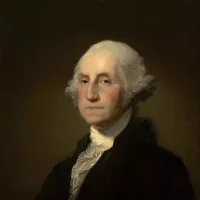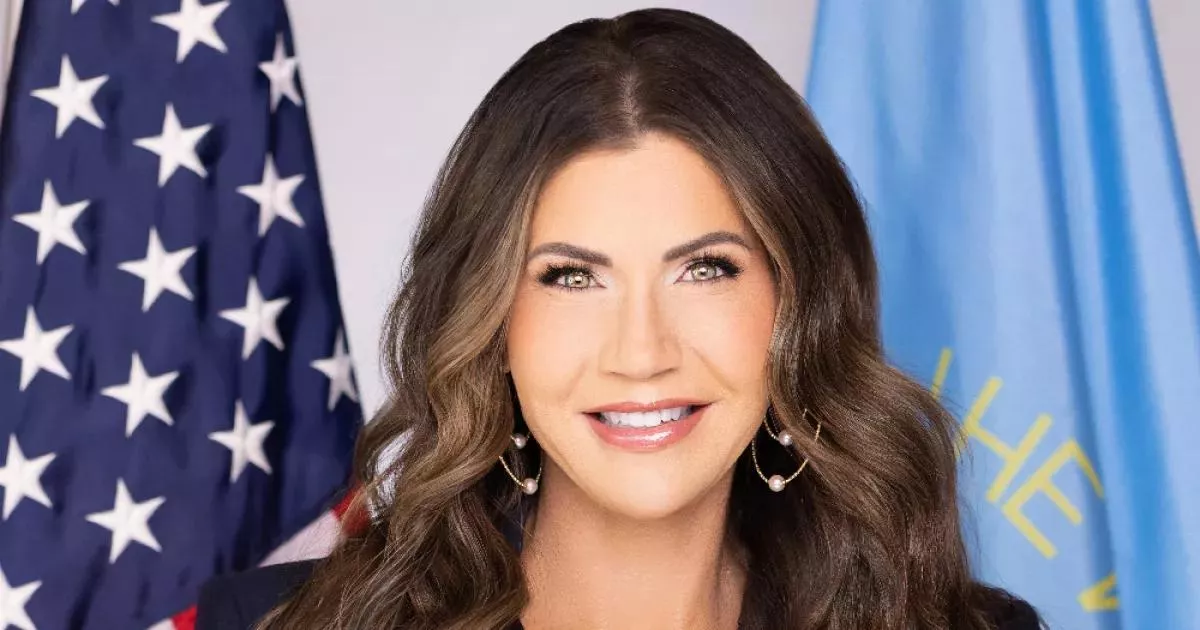Resilience and perseverance in the journey of Kristi Noem. A timeline of obstacles and growth.
Kristi Noem is an American politician who has served as the 8th United States Secretary of Homeland Security since 2025. A Republican, she previously served as the 33rd Governor of South Dakota from 2019 to 2025. Before becoming governor, Noem represented South Dakota's at-large congressional district in the U.S. House of Representatives from 2011 to 2019.
March 1994: Father's Death and Taking Over Family Farm
In March 1994, Kristi Noem's father died in a grain bin accident, leading her to leave college early and take over the family farm.
March 13, 2020: K-12 schools closure order
On March 13, 2020, Noem ordered K-12 schools in South Dakota to close in response to the COVID-19 pandemic.
April 6, 2020: Executive order and CDC guidelines
On April 6, 2020, Noem issued an executive order that said people "shall" follow guidance from the Centers for Disease Control and Prevention; she also ordered everyone over age 65 in Minnehaha and Lincoln counties to stay home for three weeks.
April 9, 2020: Inspectors allowed to wear masks
On April 9, 2020, the Food Safety and Inspection Service said its inspectors would be allowed to wear masks if the meatpacking plants' owners gave permission; inspectors were expected to supply their own masks.
April 13, 2020: Comments on Smithfield outbreak
On April 13, 2020, regarding the outbreak at the Smithfield pork plant, Noem told Fox News, "We believe that 99 percent of what's going on today wasn't happening inside the facility".
April 2020: Peters Receives Agreed Disposition
Around March/April 2020, Kassidy Peters received an Agreed Disposition regarding her real estate appraisal license denial.
July 3, 2020: Event at Mount Rushmore with Trump
On July 3, 2020, Noem did not mandate social distancing or mask-wearing at an event at Mount Rushmore with Trump present, despite health experts' warnings about the risks. She publicly doubted scientific recommendations on masks.
July 20, 2020: Peters receives letter
Around July 20, 2020, Kassidy Peters received a letter and/or Findings of Fact and Conclusions of Law when she failed to meet the requirements of the Agreed Disposition.
October 22, 2020: Record high hospitalizations
On October 22, 2020, COVID-19 patients hospitalized in South Dakota reached a record high of 355, including 75 in Intensive Care Units. Hospital systems rescheduled elective procedures, and the Sioux Falls Mayor advised people to "Wear a dang mask."
November 2020: Promotion of tourism during COVID-19 surge
In November 2020, Noem used pandemic relief funds to promote tourism during a surge in COVID-19 cases in South Dakota. She also did not implement mask mandates, raised doubts about mask efficacy, encouraged large gatherings without precautions, and questioned public health experts' advice.
December 2020: No statewide mandates
As of December 2020, Noem was one of the few governors who had not maintained statewide stay-at-home orders or face-mask mandates in response to the COVID-19 pandemic.
2020: Opting out of federal unemployment benefits
In 2020, Noem opted out of the U.S. federal government's enhanced weekly unemployment benefits of $300, making South Dakota the only state to refuse the assistance.
2020: Meeting about daughter's appraisal license
In 2020, after Noem's daughter, Kassidy Peters, was denied a real estate appraisal license, Noem summoned Sherry Bren, a state employee, to her office. Attendees included Peters, Noem's chief of staff, a Department of Labor Attorney, and the Labor Secretary.
2020: COVID-19 outbreak
In early 2020 one of the largest COVID-19 outbreaks in the U.S. occurred in South Dakota, including at the Smithfield Foods plant in Sioux Falls, where several workers died and many tested positive.
July 2021: Department of Corrections changes
In July 2021, Noem placed Secretary of the Department of Corrections Mike Liedholt on administrative leave and fired South Dakota State Penitentiary Warden Darin Young and Deputy Warden Jennifer Dreiske. Later that month, she ended the prison's mask mandate.
August 2021: Review of Department of Corrections
In August 2021, Noem announced that the CGL Group was hired to review the Department of Corrections operations for $166,410. At the same time, the director of the prison work program was fired, and two other DOC employees relieved of their duties.
September 22, 2021: Center for Public Integrity lawsuit
On September 22, 2021, the Center for Public Integrity sued the South Dakota National Guard and the U.S. Department of Defense to obtain documents about the deployment of National Guard members to Texas's border with Mexico and the donation funding it.
October 2021: Committee investigation into appraisal program
In October 2021, the State Senate's Government Operations and Audit Committee invited Marcia Hultman and Sherry Bren to discuss the appraisal program in light of the controversy.
November 1, 2021: Government Accountability Board agenda
On November 1, 2021, the Government Accountability Board set an agenda to discuss complaints brought by Ravnsborg.
December 14, 2021: Bren's testimony before the Government Operations and Audit Committee
On December 14, 2021, Sherry Bren testified before the Government Operations and Audit Committee, stating that Peters received an Agreed Disposition around March/April 2020 and a letter/Findings of Fact and Conclusions of Law around July 20, 2020, when she failed to meet the requirements of the Agreed Disposition.
December 15, 2021: Government Accountability Board refers complaints to Noem
On December 15, 2021, the Government Accountability Board referred one of the two complaints to Noem for a response and sent the other back to the complainant.
February 3, 2022: Second complaint referred to Noem
On February 3, 2022, the Government Accountability Board referred the second complaint to Noem for a response and gave her until April 15, 2022, to answer both pending complaints.
February 24, 2022: House Resolution 7004 introduced against Noem
On February 24, 2022, Republican State Representative John Mills introduced House Resolution 7004, "Addressing the Governor's unacceptable actions in matters related to the appraiser certification program", against Noem.
March 14, 2022: Bawek files lawsuit
On March 14, 2022, Stephany Bawek, the prison work program director, filed a lawsuit in federal district court alleging that she was fired for reporting incidents of sexual harassment in the workplace.
April 15, 2022: Deadline to answer complaints
April 15, 2022, was the deadline given to Noem by the Government Accountability Board to answer the pending complaints.
2022: TikTok ban on state devices
In 2022, Noem issued an order banning TikTok from state-owned devices, stating that the Chinese Communist Party uses information gathered on TikTok to manipulate the American people.
2022: Ban on private funding
In 2022, the National Defense Authorization Act banned National Guard members from crossing state borders to perform duties paid for by private donors.
January 2024: Noem's comments on southern border and drug cartels
In January 2024, Noem stated that an "invasion is coming over the southern border" of the United States and the "enemy is the Mexican drug cartels", who are "perpetrating violence in each of our states, even here in South Dakota" and using reservations to spread drugs.
March 2024: Noem's comments on tribal leaders and reservation conditions
In March 2024, Noem said that she believes "some tribal leaders are personally benefiting from the cartels being there", gave no evidence to support this claim and that people on the Pine Ridge reservation are scared and live with high unemployment and lack of parental support.
2024: Tribes ban Noem from tribal lands
In 2024, nine tribes of South Dakota banned Noem from entering any tribal lands, prohibiting her from entering almost 20% of South Dakota. However, some reports indicated that one tribe had not officially banned her.
Mentioned in this timeline
TikTok also known as Douyin in China is a social...

Tencent is a Chinese multinational technology conglomerate headquartered in Shenzhen...

Barack Obama the th U S President - was the...
WeChat also known as Weixin in Chinese is a multipurpose...

The White House located at Pennsylvania Avenue NW in Washington...

Joe Biden is an American politician who served as the...
Trending

46 minutes ago Kevin Fiala injured during Switzerland vs. Canada Olympics game, stretchered off ice.
46 minutes ago Bride integrates Bad Bunny Super Bowl halftime into wedding; Republicans react to performance.

46 minutes ago Brewers sign Luis Rengifo to a one-year deal, adding infield depth.

2 hours ago Presidents' Day Sales: Early Deals on Amazon, Apple, Carhartt, and Sealy products.
2 hours ago Kazakhstan Faces Scrutiny Over Extradition and Asylum Decisions Involving Russian Activists

2 hours ago Yuma Kagiyama aims for gold at 2026 Winter Olympics with quad flip.
Popular

Kid Rock born Robert James Ritchie is an American musician...
The Winter Olympic Games a major international multi-sport event held...

Barack Obama the th U S President - was the...

XXXTentacion born Jahseh Dwayne Ricardo Onfroy was a controversial yet...

Pam Bondi is an American attorney lobbyist and politician currently...

Michael Joseph Jackson the King of Pop was a highly...
